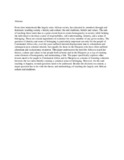| dc.description.abstract | From time immemorial the largely orate African society has educated its members through oral
literature; teaching society’s history and culture: the oral traditions, beliefs and values. The aim of
teaching these tenets has to a great extent been to create homogeneity in society while helping the
individual to develop a sense of responsibility, self-understanding, identity, and a sense of
belonging.1 These are crucial ingredients of existence for every member of any given society. The
question of identity and sense of belonging is particularly important not only for the people of
Continental Africa who, over the years suffered internal displacement due to colonialism and
subsequent post-colonial misrule, but equally for those in the Diaspora who have often suffered
alienation and exclusionary treatment.
This paper underscores the need for Africa to teach her history, culture and values to her people
both at home and in the Diaspora as a way of creating some element of homogeneity and
maintaining a link. The paper specifically explores what lessons need to be taught to Continental
Africa and its Diaspora as a means of fostering cohesion between the two sides thereby creating a
common sense of belonging. However, for the said teaching to happen, several questions need to be
addressed. Besides the decision on content, a major question has to do with the theory and
methodology of teaching the largely oral African culture and traditions. | en_US |


